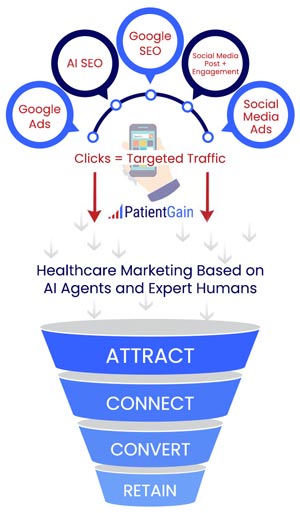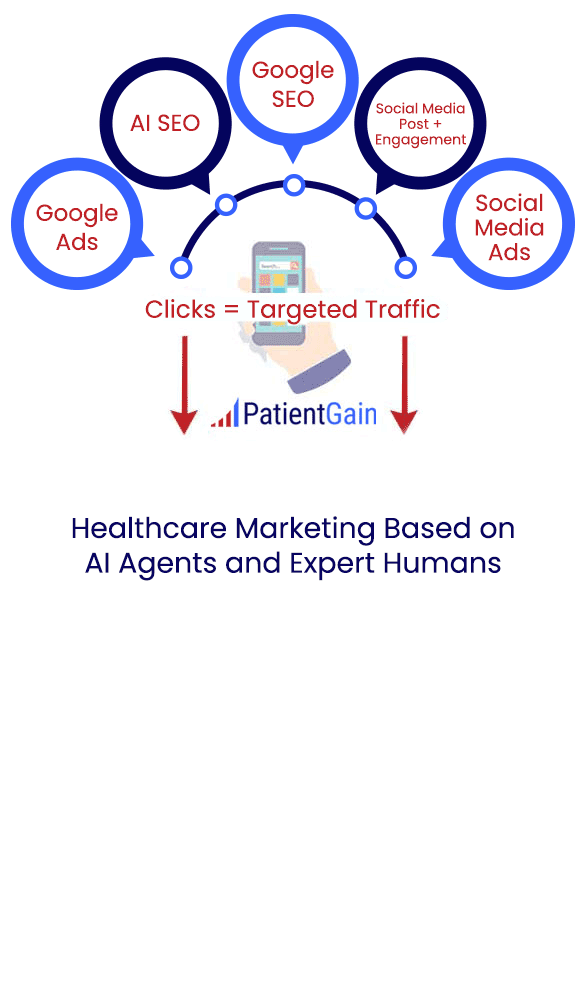Which one is better for a healthcare practice? ChatGPT SEO versus Google SEO For Doctors
Google SEO should be your primary focus for driving website traffic and local SEO in the healthcare industry. It offers measurable, long-term results for patient acquisition and helps you stay competitive in your local market. “ChatGPT SEO” (also known as Answer Engine Optimization or AEO) for doctors involves optimizing a practice’s online presence to be discoverable by AI tools like ChatGPT and Google’s AI overviews. This is distinct from traditional SEO, as AI models prioritize structured, authoritative, conversational, and patient-centric content rather than just keywords.


ChatGPT SEO can be a complementary strategy to improve how your practice appears in AI-driven queries and to enhance your patient engagement through interactive content and real-time answers. Both approaches are valuable, but for most practices, Google SEO is the foundation for online visibility. ChatGPT SEO adds an additional layer to help with AI-driven patient interactions.
Simple formula: Based on 10+ years of experience from PatientGain’s digital marketing for healthcare
1. Website is the anchor for the short term & long term success for your business.
2. Long term strategy: SEO and being present in AI related searches – like ChatGpt, Gemini
3. Short term strategy: Advertising on Google, Facebook, Instagram and other websites.
Comparison: Google SEO vs. ChatGPT SEO For Healthcare Websites
| Aspect | Google SEO | ChatGPT SEO |
|---|---|---|
| Primary Goal | Increase visibility in Google search results | Enhance representation in AI-generated responses |
| Content Creation | Unique, high-quality content reviewed by experts | AI-generated content with human oversight |
| Local Optimization | Focused on local search and Google Maps | Less emphasis on local search |
| Compliance Standards | Adheres to E-E-A-T guidelines | Requires careful review to meet medical standards |
| Long-Term Impact | Builds sustainable online presence | Provides supplementary visibility |
What is the difference between how a tool like ChatGPT works versus a search engine like Google?
When considering SEO for healthcare practices, it’s important to differentiate between ChatGPT SEO and Google SEO, as they serve different purposes, and each has its strengths depending on your goals. Let’s break them down to understand which might be better for your healthcare practice.
1. Google SEO for Doctors
Google SEO is the most commonly used and traditional approach to improving a healthcare practice’s online visibility. It is based on Google’s algorithms and focuses on ranking websites higher in organic search results for relevant search queries (such as “dentist near me” or “best plastic surgeon in [city]”).
How Google SEO Works for Healthcare Practices:
- Keyword Optimization: Focusing on relevant and localized keywords that potential patients are searching for, like “cardiologist in [city]” or “best dentist near me”.
- On-page SEO: Optimizing the title tags, meta descriptions, headers, and content to rank higher for target keywords.
- Local SEO: Optimizing for Google My Business (GMB), creating location-based content, and acquiring local backlinks to help your practice show up in local searches.
- Content Marketing: Creating valuable, informative, and relevant content such as blogs, service pages, FAQ sections, and patient testimonials that improve user engagement and drive traffic.
- Technical SEO: Ensuring your website is optimized for mobile devices, has fast loading speeds, and follows best practices for search engine crawlers.
- Patient Reviews and Reputation: Google SEO relies heavily on patient reviews for increasing trust and ranking on local searches. Positive reviews help you stand out in Google’s local pack.
Advantages of Google SEO for Healthcare:
- Direct visibility in search results: By ranking for relevant search queries, you can directly drive patients to your website.
- Localized targeting: Google SEO is highly effective for local SEO, which is crucial for healthcare practices, as patients often look for services near them.
- Ongoing organic traffic: If done correctly, Google SEO offers long-term traffic with no ongoing ad spend.
- Measurable: Google provides detailed analytics through Google Analytics and Search Console, enabling you to track the performance of your SEO efforts.
Challenges of Google SEO for Healthcare:
- Long-Term Process: It takes time to see results from Google SEO, as ranking organically requires building authority, quality backlinks, and consistent optimization.
- Highly Competitive: The healthcare niche is very competitive. Getting to the top of Google search results for highly competitive keywords can be difficult without significant effort and investment.
2. ChatGPT SEO for Healthcare Practices
ChatGPT SEO, on the other hand, refers to optimizing content or website elements in a way that increases the likelihood that ChatGPT or similar AI tools (like Google Assistant, Siri, etc.) will generate relevant responses based on your practice’s services and information.
ChatGPT doesn’t index websites the same way that Google does. Instead, it relies on a combination of existing public data, the information provided in training, and structured data to generate responses. It uses AI to summarize and provide insights, often answering queries that don’t have a straightforward answer but can be inferred from patterns in the data.
How ChatGPT SEO Works for Healthcare Practices:
- Data Structuring: Ensuring that your practice’s information is structured correctly and easy for AI to parse (using schema markup and structured data). This helps AI systems like ChatGPT understand your services and answer queries accurately.
- User Queries and Engagement: ChatGPT can provide personalized responses to complex healthcare-related queries, like “What are the symptoms of diabetes?” or “How to prepare for a root canal?”. Ensuring your website provides concise, clear, and authoritative content will increase the chances of it being referenced by AI models.
- Content Accuracy: AI models like ChatGPT prefer content that is well-written, accurate, and trustworthy. Content on your website, such as FAQs, patient guides, and service pages, should be clear and fact-checked to improve the likelihood of AI referencing your site.
- Integration with AI Platforms: It’s important to consider that ChatGPT SEO is also about integrating your practice with AI-powered platforms and tools that aggregate healthcare data. For example, healthcare directories or review sites that are used to train AI systems like ChatGPT may play a role in improving your practice’s visibility in AI-generated responses.
Advantages of ChatGPT SEO for Healthcare:
- Direct Answers to Complex Queries: ChatGPT excels at answering specific or nuanced questions. For example, instead of listing a practice website in search results, ChatGPT can generate a response that summarizes key points from your site.
- Content Recommendations: AI can provide personalized content recommendations and guidance, which is helpful for patient education.
- Increasing Use of AI Tools: As more people turn to voice assistants and AI-driven tools for quick answers, having your website optimized for ChatGPT can improve your practice’s discoverability.
- Real-Time Interaction: ChatGPT’s ability to offer real-time responses means it’s perfect for engaging patients at any point in their decision-making journey.
Challenges of ChatGPT SEO for Healthcare:
- Dependence on External Platforms: ChatGPT doesn’t directly index websites like Google. Instead, it pulls data from publicly available sources, meaning that control over how your content appears in AI-driven responses is more limited.
- Unpredictable Outcomes: There is no guaranteed way to ensure your content will appear in a ChatGPT answer, as the AI’s responses are generated based on a wide variety of sources, not just your website.
Medical SEO Using ChatGPT VS Google SEO
The two platforms operate on entirely different principles. Understanding this distinction is key to developing a strategy that will actually help patients find your healthcare practice.
The Critical Difference: ChatGPT vs. Google Search
- Google Search is a real-time index of the live internet. It constantly crawls websites, updates its index, and uses complex algorithms (now heavily influenced by AI) to rank pages based on relevance and authority. You can directly influence Google’s results through SEO.
- ChatGPT (and other Large Language Models – LLMs) is a closed system that was trained on a massive, but static, dataset of text and information from the internet at a specific point in time. It does not crawl the web in real-time to answer your questions. It generates responses based on the patterns, facts, and language it learned from its training data.
Why This Matters for Your Healthcare Practice:
Because ChatGPT isn’t searching the live web, it cannot “look up” your practice in real-time to see if you offer a specific service or what your current hours are. For your practice to be mentioned, its information must have been so prominent, widespread, and frequently cited in the training data that the model “learned” it as a fact. For a single local medical practice, even a prominent one, this is highly unlikely compared to major institutions like the Mayo Clinic or Stanford Health Care.
CAUTION: Relying on LLMs like ChatGPT for patient referrals is risky. They are known to “hallucinate”—confidently stating incorrect information, such as a wrong phone number, an old address, or services you don’t offer.
How to get my medical practice in ChatGpt when someone looks for my medical practice services?
To ensure your medical practice appears in search results on ChatGPT, focus on optimizing your online presence, particularly your website, with structured data, clear information, and relevant keywords. This will help ChatGPT understand and represent your practice accurately when users ask about your services.
How to Be Found by Patients Today and Influence the AI of Tomorrow
Instead of trying to optimize for the closed and unpredictable world of ChatGPT, the correct and far more effective strategy is to dominate the public web sources that patients use directly and that AI models use for their training data.
By building an unimpeachable online presence, you achieve two crucial goals:
- You will be found by patients who are actively searching for your services on Google today.
- You will be creating the high-quality, authoritative data that will inevitably be used to train the more advanced and reliable AI assistants of the future.
Here are the key strategies to focus on:
1. Master Google Search & Local SEO (Your #1 Priority)
This is where patients in Palo Alto are reliably searching for medical care right now. Google’s own AI Overviews pull information directly from its search index, making this your most direct path to influencing Google’s AI.
- Perfect Your Google Business Profile (GBP): This is your digital front door on Google. Ensure your practice name, address, phone number, website, hours, and services are 100% accurate. Actively encourage patient reviews and upload high-quality, recent photos.
- Optimize Your Website for Local Keywords: Your website content must be optimized for terms patients use, such as “med spa Palo Alto,” “semaglutide treatment near University Ave,” or “best dermatologist for acne near Stanford.”
2. Build an Authoritative Website (Your E-E-A-T Hub)
Your website is the cornerstone of your digital identity. Google’s AI is explicitly programmed to look for signals of E-E-A-T (Experience, Expertise, Authoritativeness, and Trustworthiness).
- Showcase Expertise: Create detailed professional bios for all your providers, listing their board certifications, education, and years of hands-on Experience.
- Create In-Depth Content: Develop comprehensive pages for every service you offer. Explain the condition, the procedure, the benefits, and what patients can expect. This builds Authority and Trustworthiness.
3. Cultivate a Robust Digital Footprint and Reputation
The more high-quality, consistent mentions of your practice exist across the web, the stronger the “pattern” an AI model can learn.
- Generate Patient Reviews: A steady stream of recent, positive reviews on Google, Yelp, and Healthgrades is a powerful signal of trust.
- Get Listed in Reputable Directories: Ensure your practice information is correct and consistent across all major medical and local business directories.
4. Utilize Structured Data (Schema Markup)
This is a technical but vital step. Schema is code added to your website that explicitly labels your information for search engines and AI, removing any ambiguity.
- Implement Medical Schema: Use specific schema like
MedicalClinic,Physician, andReview. This tells the AI, “This is a medical clinic located at this address,” “This is Dr. Evans, a board-certified physician,” and “This is a 5-star review from a patient.”
Conclusion
To ensure patients find your Palo Alto medical practice, focus your efforts on mastering the open and reliable world of Google Search, not the closed system of ChatGPT.
By building a dominant online presence based on expertise, authority, and trust, you will capture the high-intent patients who are looking for your services today. In doing so, you will also be creating the definitive, high-quality data that will inform and train the AI assistants of tomorrow.

